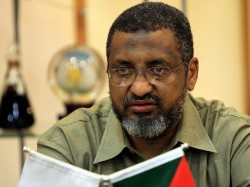Sudanese economy hurt by falling oil prices and ICC case against Bashir
February 22, 2009 (KHARTOUM) – The Sudanese economy is beginning to feel effects related to steep drop in oil prices and the widely expected arrest warrant by the International Criminal Court (ICC) for president Omer Hassan Al-Bashir.

“Big investors all over the world will be waiting to see how the ICC will go,” Al-Hassan said.
“The wait-to-see environment is not positive for Sudan. It is harming Sudan” he added.
This is the first time a Sudanese official speaks about impact of the ICC indictment on investors’ confidence. Khartoum has previously thought to warn of the security threats posed to Westerners by “outlaws” or Islamic extremists following an ICC arrest warrant.
The Sudanese energy minister also expressed fears of sanctions imposed by the UN Security Council (UNSC) as a result of his government refusing to cooperate with the Hague-based court.
“We don’t know if (the ICC arrest warrant) will happen and, if it happens, how the international community is going to go with this” said Al-Hassan.
“There are already sanctions in many areas … We don’t know if this will go to another stage of U.N. sanctions” he said.
China which buys two thirds of Sudan’s oil has in the past resisted any UNSC attempts for tougher measures against Khartoum over the Darfur conflict.
Sudan has also been confronted with a financial crisis in wake of the falling oil prices which forms the bulk of the country’s export and main source of hard currency.
Last Friday South Sudan’s finance minister Kuol Athian disclosed that the semi autonomous government is struggling to pay salaries.
Ministry officials said the region received just over a quarter of the 300 million Sudanese pounds ($133 million) of oil revenues that it had budgeted for in January.
Athian said that early indications show that they do not have enough cash to pay February salaries.
“This has created a big problem for us … It will affect everything,” he said.
The finance official also said that Sudan’s central bank was beginning to send oil revenues to the south in local currency.
The lack of foreign currency, he added, would hit the south’s ability to attract investors and limit the Bank of South Sudan’s ability to service local banks.
The Juba-based semi-autonomous Government receives 50% of oil revenues produced in the South from the Khartoum-based Government of National Unity (GoNU) per the wealth sharing provisions of the Comprehensive Peace Agreement (CPA).
The oil revenues account for ninety-seven (97%) of the overall budget in the region which produces about half a million barrels of oil per day.
Last week the deputy finance minister Al-Tayib Abu-Gnaya told Sudanese lawmakers that oil revenue has declined since January adding that no proceeds will be left over until April.
“We are now in February and not a single dollar has been received by treasury” Abu-Gnaya said.
“We barely covered [our expenses] for the first quarter in the budget. We still had to borrow from the banks” he added.
Sudan’s 2009 budget has forecasted revenue based on $50 per barrel sharply contrasting current market price of $36.
(ST)

Magos
Sudanese economy hurt by falling oil prices and ICC case against Bashir
Mr Minister al-Hassan you ‘ve to think twics ,How ‘ll the life could be when you confronting the ICC indictment for president Omer Hassan Al-Bashire? Do you think ‘s a better way to ‘ve a fighting with International communities?let me advice you don’t worry about the turndown of Sudan economy ‘indeed you ‘ve to think about how to solve the problem between you and UNSC or ICC ,however the only way ‘s to handover the Mr Bashire to International Criminal Court and than your economy ‘ll come back to it roots if n’t you ‘ll going to suffering a lot,because of your crimes act.
Magos
babiker
Sudanese economy hurt by falling oil prices and ICC case against Bashir
Comments made by Mr Alhassan are reflecting the ultimate worries country may face if ICC warrant turns positive.. irrespective of how we react and percieve the ICC move, we are really amazed to see that Government is also adopting wait and see senario .. we must build possitive senarios that will elleviate the political and economic effect in such a situation.. we must have adopted local financial and fiscal policies that motivates and expands our production capacity, we must bailout our exporters, farmers, cattle growers, manufacturers who are either out of the production cycle or spending unlimited imprissonment for insolvency.. its not only military senarios that we may need, its also measures for safekeeping the society safety and wellbeing .. although its already too late but lets start.
Nagi Babiker